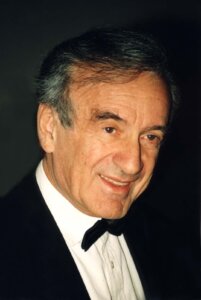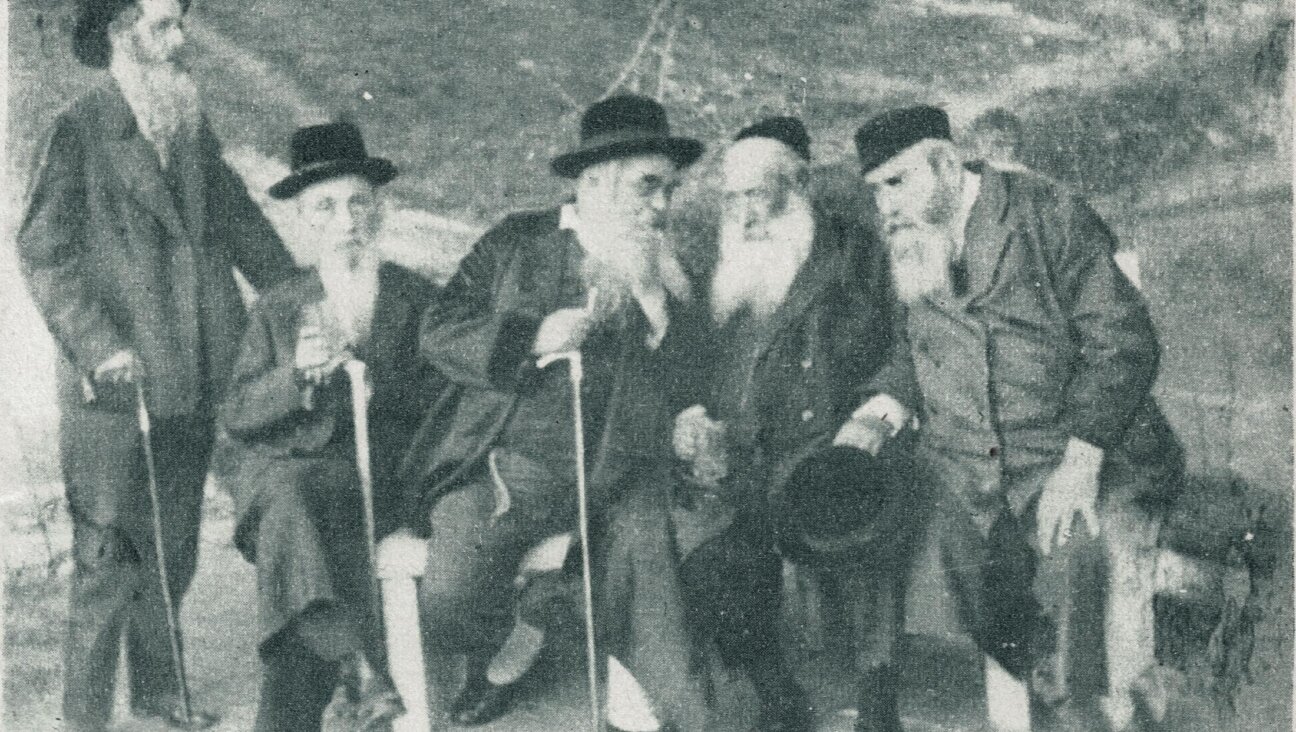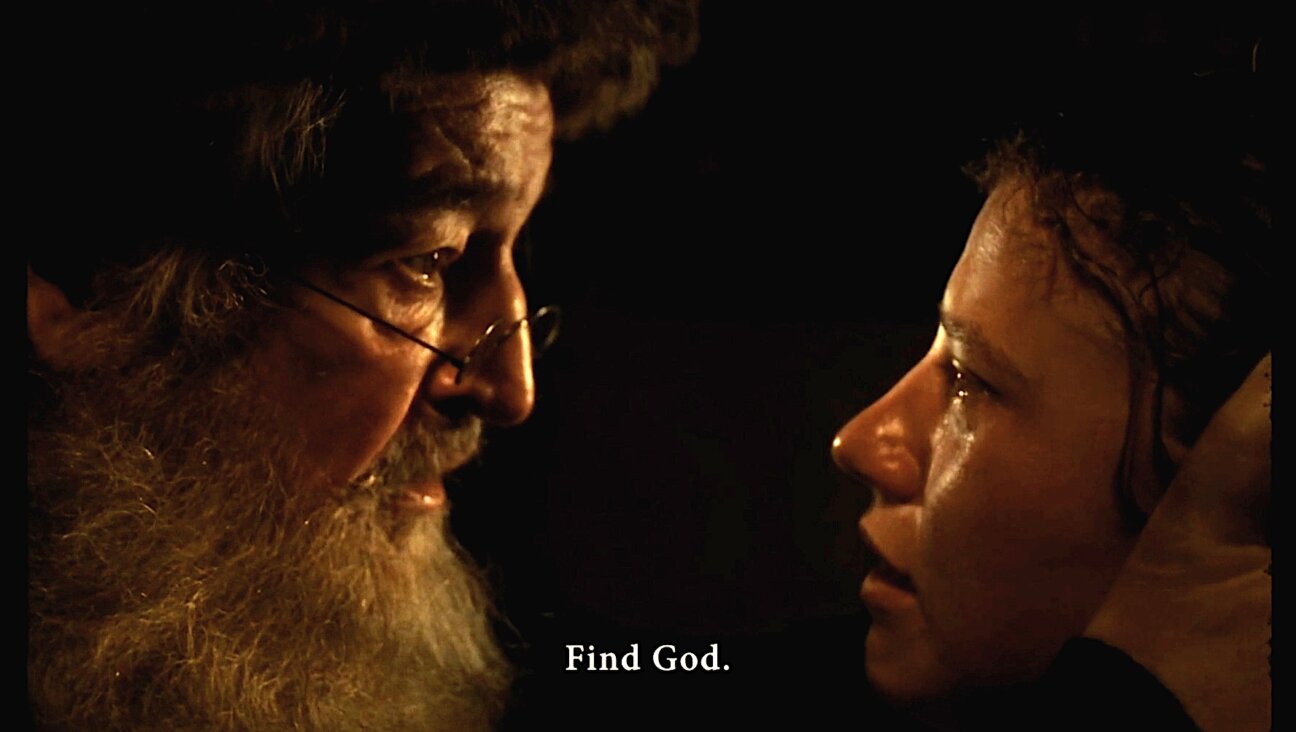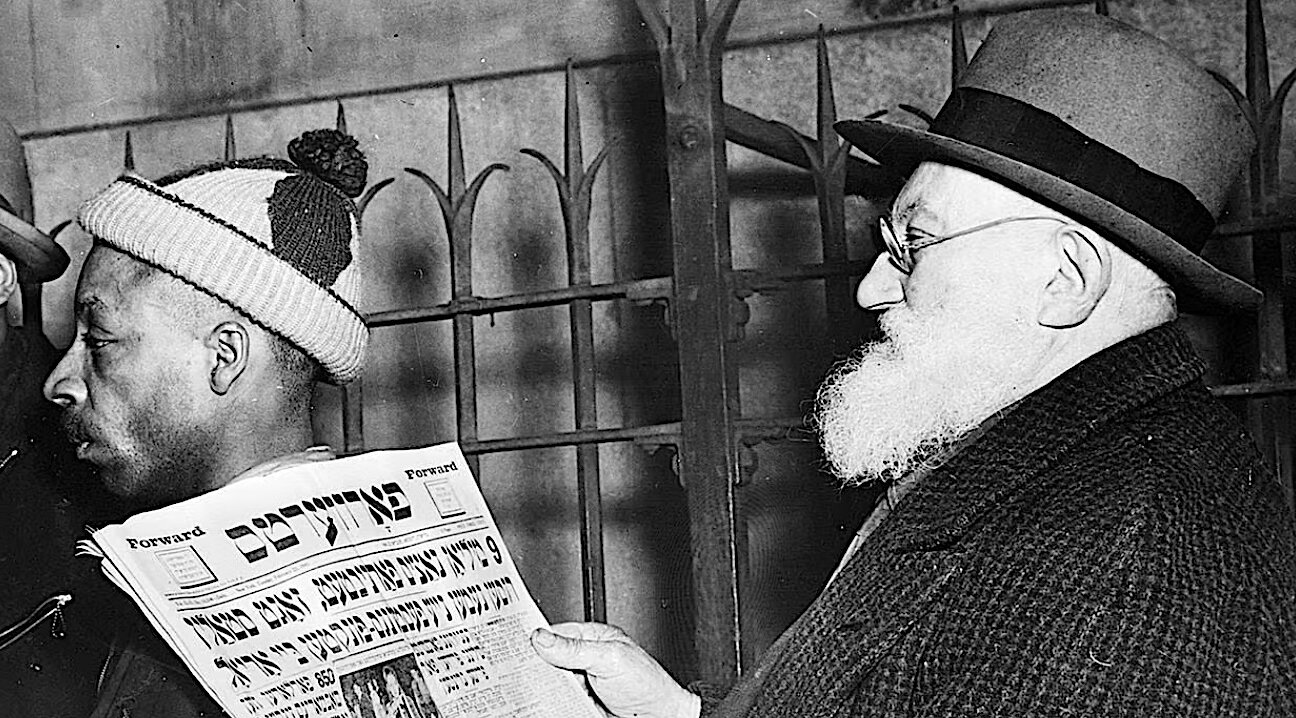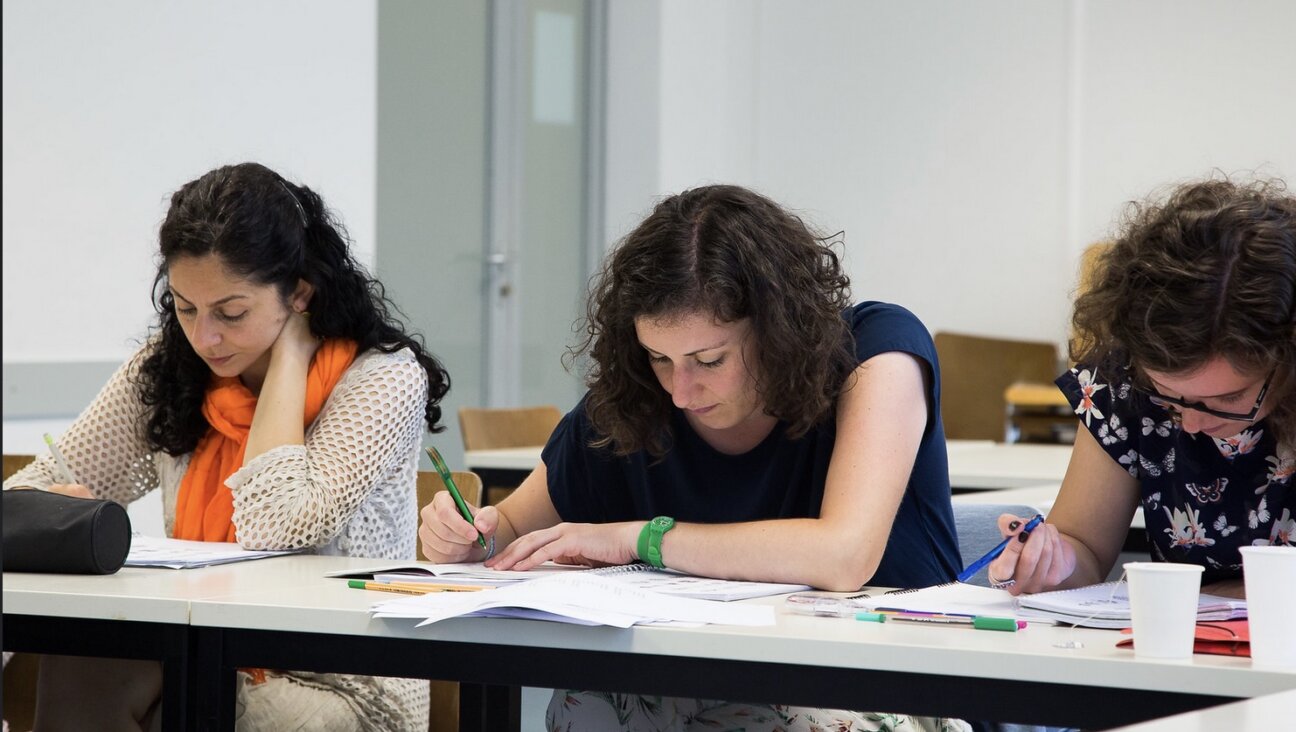What Elie Wiesel saw in Moscow on Simchat Torah in 1965
Defying the KGB agents milling around, thousands of Jews tried to get into the great hall of the synagogue
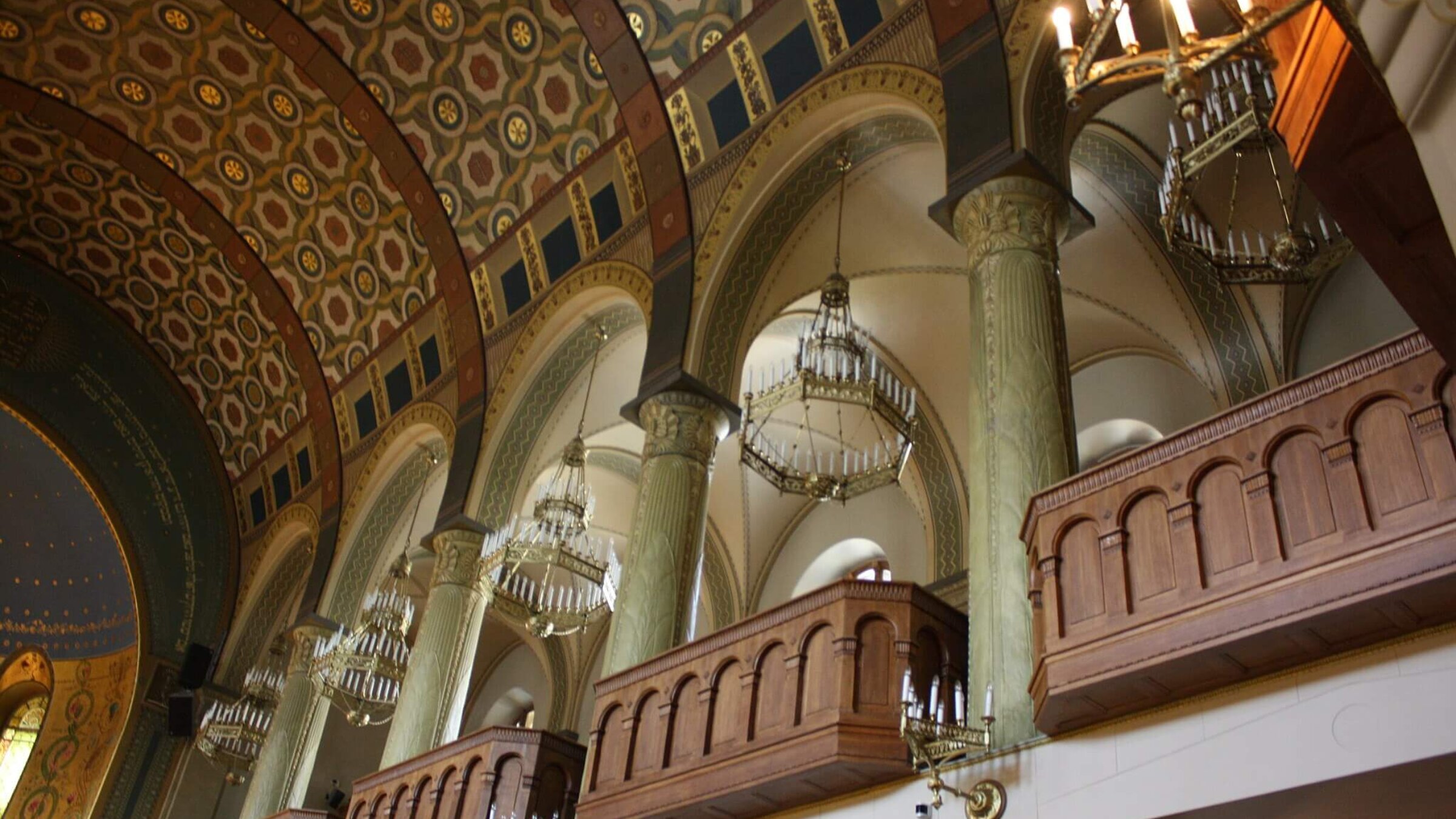
The interior of the Moscow Choral Synagogue, where the Simchat Torah celebration took place Courtesy of Wikimedia Commons
Elie Wiesel traveled to Russia as a reporter for the Forverts in 1965, choosing to spend the Simchat Torah holiday in Moscow, dancing with the young Russian Jews who were fearless enough to publicly celebrate a Jewish holiday under the watchful eye of the KGB.
As he wrote in the pages of the Forverts: “Jewish youth refuse to inherit their elders’ terror. Let the local press deride them, let their oppressors implode with anger. They refuse to be robbed of their Jewishness and have their annual yontef (holiday celebration) beneath the open skies ruined.”
Here is an abridged version of his report, as it appeared in his 1966 book, ‘The Jews of Silence’.
Where did they all come from? Who sent them here? How did they know it was to be tonight, tonight on Arkhipova Street near the Great Synagogue? Who told them that tens of thousands of boys and girls would gather here to sing and dance and rejoice in the joy of the Torah? They who barely know each other and know even less of Judaism—how did they know that?
I spent hours among them, dazed and excited, agitated by an ancient dream….He who has not witnessed the Rejoicing of the Law [Simchat Torah] in Moscow has never in his life witnessed joy. Had I come to Russia for that alone, it would have been enough.
**
…The “festival of youth” [Simchat Torah] has become something of a Russian tradition since it first began four or five years ago during the period of internal easement inaugurated by Nikita Khrushchev. At first the festivals were attended by a few hundred students; then the number grew into the thousands. Now they come in tens of thousands.
Objective observers like to claim that the gatherings have no relation to Jewish religious feeling. Young people come to the synagogue as they would to a club, in order to make new friends and learn new songs and dances. If they had someplace else to go, they wouldn’t come to the synagogue.
I should say this explanation is not entirely correct. There is no lack of meeting places in Moscow; young people can get together either downtown, at the university, or at the Komsomol* clubs. If they come to the synagogue, it is because they want to be among Jews and to be at one in their rejoicing with their fellow Jews all over the world, in spite of everything, and precisely because they have received an education of a different sort entirely. They come precisely because of the attempts that have been made to isolate them from their heritage, and they come in defiance of all efforts to make Judaism an object worthy of their hatred.
If they were allowed to live as Jews in a different way, in a different time, or in a different place, it is true that they would probably not gather together at the synagogue on this holiday of light and joy. But they have no alternative, and if they seize the excuse to come to Arkhipova Street, it is a sign that they wish to live as Jews … at least once a year, for one full evening. Somehow that will make them capable of waiting until the next time…
…I wanted to see young people, to measure the extent of their Jewishness and discover its means of expression. I rehearsed dozens of questions to ask them, scarcely realizing that when the moment came I would forget them all. While traveling through Russia I had spoken mostly with the elderly or middle-aged. Many of them had expressed anxiety about the younger generation, its increasing estrangement and assimilation. They told me there was little hope for the perpetuation of Judaism in Russia.
In America and Europe I had heard Russian representatives, Jewish and non-Jewish, who had taken the line of cold logic—there is no Jewish life in Russia simply because Jewish youth is not interested in it. It is for this reason alone that there are no Yeshivot, no Jewish grade schools, no Jewish clubs, no writers and no readers and no future. Judaism is strictly for the old. This explanation is put forth by everyone who comes from Moscow to speak about the “Jewish problem” in Russia. Full blame is placed upon the younger generation.
But tonight we would discover the truth. Youth itself would take the witness stand. It was years since I had last prepared for the night of Simchat Torah with such anticipation, such a sense of awe and excitement. I knew something would happen, something vast, a revelation. I was taut and fragile as the string on a violin…
Apparently the Soviet authorities also expected a large crowd, and they did their best to frighten it away. It had been made known that during the High Holy Days everyone entering the synagogue had been photographed. And now in front of the synagogue, two gigantic floodlights had been installed, illuminating the entire street. The Jews were not to forget that someone was watching. The Jews would do well not to become too excited or to betray an overly Jewish character in their rejoicing.
They came nevertheless. Inside, the great hall of the synagogue was crammed with more than two thousand men and women. Many brought their children, for children, too, were to see that the Jews knew how to rejoice. The atmosphere was festive. Young girls stood among the men on the ground floor. The balcony was overflowing. People smiled at one another. Wherefore was this night different from all other nights? On all other nights we live in fear; tonight we are free men. Tonight one is permitted even to smile at strangers.
…“Would you give your flag to my grandson?” an elderly man asked an Israeli child who held a pennant in his hand. The boy smiled and nodded. “Here you are.”
The Russian child took the Jewish flag and kissed it. An informer came up and demanded that the old man return the gift. He hesitated a second, took courage, then said no. His friends stood at his side. The informer bowed his head. Tonight he was alone.
…The gabbai banged on the table and shouted for silence….Rabbi Yehudah-Leib Levin was honored with the first verse, “Thou hast caused us to know”…The Israeli ambassador, Mr. Katriel Katz, was given the honor of reciting a verse, “Thy priests shall be clothed in righteousness, and thy faithful ones rejoice.”…People stood on tiptoe to see the representative of the sovereign State of Israel. His presence made them straighten up; they seemed taller.
The scrolls of the Torah were taken from the Ark and the dignitaries of the community invited to lead the first procession. The people crowding into the synagogue tonight were simple Jews who had come to learn that it was possible to be a Jew and to find reasons for rejoicing … or to rejoice for no reason at all. Longbeards and workers, old and young, widows and lovely girls, students and bureaucrats. Among them there were many who had never prayed but who had come to watch the processions and to honor the Torah.
…The entire Israeli diplomatic corps was present, together with their wives and children. We sang, “Gather our scattered ones from among the nations, and our dispersed from the corners of the world.” …A number of the diplomats belonged to left-wing parties. In their youth they had scorned religion, and religious people in particular. Tonight they celebrated the holiday with hasidic enthusiasm and abandon. Differences of opinion and class were left behind. An American writer once told me, “As I stood among the Jews of Russia, I became a Jew.” He was not alone; many who come here as Israelis also return home as Jews.
Men who had not sung for a year were raising their voices in song. Men who had not seen a Torah all year long were embracing and kissing it with a love bequeathed to them from generations past. Old men lifted their grandchildren onto their shoulders, saying, “Look, and remember.” The children looked in wonder and laughed, uncertain what was happening. No matter; they would understand later, and they would remember.
…The gabbai announced that all guests were to take part in the second [procession], and the congregation responded with new bursts of song. From one corner came an Israeli tune, “Heivenu Shalom Aleichem, We have brought peace unto you”; from another, “Hava Nagilah, Come let us rejoice.” A third group preferred a traditional song, “Blessed is our God who created us in His honor and separated us from the nations and implanted in us eternal life.”
Instead of resisting one another, the various songs seemed to fuse into a single melodic affirmation. Those who had spent years in prison or in Siberia, those who had only recently become aware of their Jewishness, now proclaimed their unity: one people, one Torah…
We held the scrolls tightly to our chests and tried to make our way through the congregation. But instead of opening a path for us they pressed in closer, as if to block the way completely. They wanted us to stay among them. We were surrounded by a sea of faces, creased, joyful, unmasked. Hats of all kinds, skullcaps of every color, handkerchiefs in place of head covering. A young girl clapped her hands, an old man lifted up his eyes as if in prayer, a laborer sighed joyfully. Old men and their children and their children’s children—everyone wanted to touch the Torah, to touch us. Everyone had something to whisper in our ears, a blessing or a secret.
…A few went further, giving vent to their innermost feelings, but always in a whisper: I have a brother in Israel, a sister in Jerusalem, an uncle in Haifa. Short notices: brother, sister, grandfather, uncle, grandson. No names. They simply wanted us to know that a part of them was there, in the land of Israel. Others used clichés that in any other context would have produced smiles of condescension or contempt. “The people of Israel lives”; “The eternity of Israel shall not prove false”; “The redeemer shall come to Zion soon in our days.” A Jew with a laborer’s cap falling over his brow pushed forward and announced that he had something to tell me but no one was to hear. He began to hum in my ear the words of “Hatikvah,” finished the first stanza, and disappeared, his face alight with victory.
…Our procession lasted about an hour. Pale and drenched with sweat, we relinquished the Torah scrolls to the next group of marchers and returned to our seats in the visitors’ section. I was out of breath and exhausted. I wanted to rest, close my eyes and wait for my strength to return. The third procession had begun. The singing reached me as if from a great distance or from behind a curtain, as in a daydream. I had never imagined that the weight and power of this experience would stun me as it did. If I had come for this alone, it would have been sufficient.
…The remaining processions we would celebrate outside…Two or three “agents” got up to follow us. Let them. The Prince of the Torah protects those who come to rejoice in His name.
The street was unrecognizable. For a second I thought I had been transported to another world, somewhere in Israel or in Brooklyn. Angels and seraphim were serenading the night; King David played his harp. The city burst with gladness and joy. The evening had just begun.
Reprinted with permission from ‘The Jews of Silence: A Personal Report on Soviet Jewry’ by Elie Wiesel, published by the Knopf Doubleday Publishing Group.
A message from our Publisher & CEO Rachel Fishman Feddersen

I hope you appreciated this article. Before you go, I’d like to ask you to please support the Forward’s award-winning, nonprofit journalism during this critical time.
At a time when other newsrooms are closing or cutting back, the Forward has removed its paywall and invested additional resources to report on the ground from Israel and around the U.S. on the impact of the war, rising antisemitism and polarized discourse.
Readers like you make it all possible. Support our work by becoming a Forward Member and connect with our journalism and your community.
— Rachel Fishman Feddersen, Publisher and CEO



